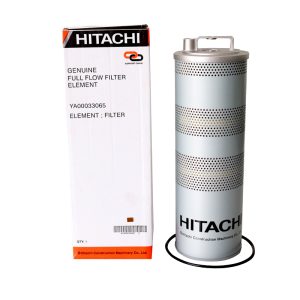Introduction
Hydraulic systems play a crucial role in various industries, ranging from manufacturing to construction. These systems rely on hydraulic oil to transmit power and lubricate moving components. However, to maintain the optimal performance and longevity of hydraulic systems, it is essential to ensure the cleanliness of the hydraulic oil. This is where hydraulic oil filters come into play. In this article, we will delve into the world of hydraulic oil filters, exploring their functionality, benefits, and importance.
What is a Hydraulic Oil Filter?
A hydraulic oil filter is a critical component within a hydraulic system that removes contaminants and impurities from the hydraulic oil. It acts as a barrier, preventing particles, debris, water, and other harmful substances from circulating through the system. By purifying the hydraulic oil, these filters help maintain the smooth operation of hydraulic components, ensuring optimal performance and reducing the risk of damage and downtime.
How Hydraulic Oil Filters Work
Hydraulic oil filters function based on the principle of filtration. They typically consist of a housing, filter media, and an inlet and outlet port. As contaminated oil passes through the filter, the filter media, often made of cellulose or synthetic materials, traps particles and allows the clean oil to pass through. The filter media’s construction and design determine the efficiency and capacity of the filter.
Importance and Benefits of Hydraulic Oil Filters
Maintaining clean hydraulic oil is vital for the efficient operation and longevity of hydraulic systems. Hydraulic oil filters offer several benefits, including:
Component Protection: Contaminants present in hydraulic oil can cause wear and damage to delicate hydraulic components such as pumps, valves, and cylinders. By removing these contaminants, filters safeguard the components, extending their lifespan and reducing maintenance costs.
Improved Performance: Clean hydraulic oil enables smoother operation, reducing friction and enhancing system performance. Filters help maintain consistent oil viscosity, preventing viscosity breakdown and the subsequent decline in system efficiency.
Increased Reliability: Unfiltered oil can lead to clogged valves, reduced flow rates, and compromised system performance. By ensuring clean oil circulation, filters improve overall system reliability, minimizing the risk of unexpected failures and downtime.
Cost Savings: Regularly replacing hydraulic components due to contamination-related damage is expensive. Hydraulic oil filters prevent premature component failure, reducing maintenance and replacement costs in the long run.
Types of Hydraulic Oil Filters
There are various types of hydraulic oil filters designed to cater to different system requirements. Some common types include:
In-line Filters: These filters are installed directly in the hydraulic line and are available in various sizes and configurations. They offer easy maintenance and are suitable for systems with low-to-medium flow rates.
Pressure Filters: Pressure filters are installed within the hydraulic circuit and operate under high pressure. They are ideal for systems that require fine filtration and can withstand high-pressure conditions.
Return Line Filters: Placed in the return line, these filters remove contaminants from oil returning to the reservoir. They are cost-effective and have a higher dirt-holding capacity.
Conclusion
Hydraulic oil filters are indispensable components in maintaining the cleanliness and performance of hydraulic systems. By removing contaminants and impurities, they contribute to increased reliability, improved efficiency, and prolonged lifespan of hydraulic components. Regular inspection, maintenance, and replacement of filters are necessary to ensure optimal system operation. Investing in quality hydraulic oil filters is a prudent decision that pays off in the form of enhanced system functionality and reduced maintenance costs.



